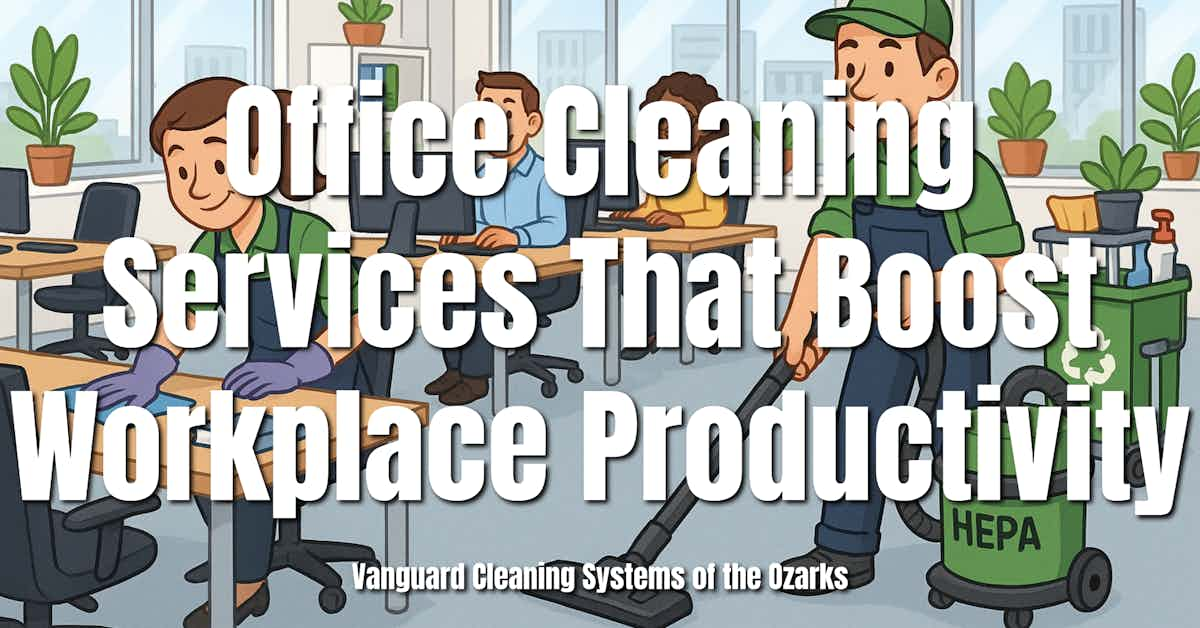A clean office doesn’t just look better—it fuels focus, reduces sick days, and drives measurable workplace productivity.

Introduction — Why Clean Offices Matter More Than You Think
Workplace productivity is often framed around technology, leadership, or employee engagement. Yet the physical environment plays just as critical a role. An untidy office full of dust, clutter, and poor air circulation quietly drains energy, creates distractions, and even spreads illness. Professional office cleaning services have moved beyond a cosmetic function. They are now central to workplace health, focus, and efficiency.
Research consistently shows that clean office environments improve employee satisfaction, lower sick days, and boost self-reported productivity. Cleanliness also reduces the cognitive load of clutter, enhances air quality, and signals to employees that their well-being matters. In a competitive business landscape, office cleaning is not an expense—it is a lever for unlocking higher performance.
The Science Behind Clean Workspaces and Productivity
Cleaner Offices Improve Satisfaction and Productivity
Employees consistently report higher satisfaction and productivity in offices where surfaces are dust-free, restrooms are hygienic, and shared areas are well maintained. Dirt, clutter, and disorganization create distractions that reduce task efficiency. When employees perceive their environment as clean, they are more likely to focus and feel motivated to do their best work.
Improved Cleaning Quality Reduces Health Complaints
High-quality cleaning lowers indoor air pollutants, reduces allergens, and minimizes the spread of germs. Studies have shown that employees in well-cleaned offices report fewer symptoms associated with “sick building syndrome” and take fewer short-term sick leaves. Small details—like regularly disinfecting shared surfaces and maintaining restrooms—can translate into fewer missed workdays and healthier teams.
Indoor Air Quality as a Driver of Cognitive Performance
Air quality has a direct link to how well employees think, process information, and stay alert. Offices with lower levels of dust, volatile organic compounds (VOCs), and CO₂ show measurable improvements in typing accuracy, math problem-solving, and task focus. Professional cleaning services improve air quality by using HEPA vacuums, low-VOC products, and regular dust removal. Clean air is brain fuel.
Environmental Interventions Boost Comfort and Focus
Systematic reviews of workplace interventions reveal that improvements in cleanliness and air quality consistently enhance health, comfort, and productivity. Employees are also more likely to describe themselves as focused and energetic in offices where cleaning is consistent and visible. Cleanliness has a psychological benefit: employees perceive it as a form of respect from their employer, which fosters loyalty and focus.
How Office Cleaning Services Deliver Productivity Gains
Reduced Absenteeism
The cost of absenteeism is one of the biggest hidden drains on productivity. Germs spread quickly through shared spaces, and surfaces like doorknobs, keyboards, and communal kitchens are prime culprits. Regular cleaning and disinfection reduce employee sick days by controlling these vectors. A clean office keeps teams healthier, leading to fewer disruptions and lower healthcare costs.
Improved Morale and Job Satisfaction
Employees notice when their environment is cared for. A clean workplace signals professionalism and respect, which in turn boosts morale. Workers who feel valued are more likely to stay engaged and motivated. Office cleaning services contribute directly to employee retention by shaping the everyday environment where people spend most of their waking hours.
Operational Efficiency
Dirty or disorganized offices lead to wasted time. Employees spend minutes searching for supplies, navigating clutter, or dealing with malfunctioning equipment caused by dust and dirt. Professional cleaning services reduce these inefficiencies. Clean carpets prevent dust buildup in HVAC systems, tidy desks encourage organization, and clear hallways improve workflow. When the environment supports work, employees can focus on the task at hand.
Positive Client and Visitor Impressions
Cleanliness is not only an internal productivity factor but also an external reputational one. Clients, partners, and prospective employees notice immediately whether an office looks professional. A tidy environment conveys competence, while a dirty or neglected space undermines confidence. Office cleaning services ensure that every visitor’s first impression is a positive one.
Mental Clarity and Reduced Cognitive Load
Clutter is more than a visual annoyance—it increases cognitive load. Employees expend mental energy simply navigating a disorderly environment, which leaves less bandwidth for creative or analytical tasks. Professional cleaning services reduce clutter and maintain organized spaces. The result is improved focus and mental clarity, which directly boosts productivity.
Best Practices for Office Cleaning That Drive Productivity
Daily Routines and Scheduled Deep Cleans
Routine cleaning maintains day-to-day hygiene, but scheduled deep cleans address areas that accumulate grime over time. Combining the two creates a consistent baseline of cleanliness and periodic refreshes that reset the environment.
Focus on High-Touch and Shared Areas
Doorknobs, light switches, shared desks, kitchen counters, and restroom fixtures are hotspots for germs. Prioritizing these surfaces in cleaning protocols dramatically reduces the spread of illness.
Enhance Indoor Air Quality
Professional services use HEPA-filter vacuums, replace HVAC filters, and select low-VOC cleaning agents. These measures maintain healthier air, reduce allergic reactions, and support cognitive performance.
Reduce Clutter and Visual Stressors
Encouraging clean-desk policies and organizing shared areas supports mental focus. Cleaning teams can assist by regularly decluttering communal areas and ensuring trash removal is consistent.
Green and Sustainable Cleaning
Eco-friendly cleaning products reduce irritants, odors, and chemical exposure. Sustainability practices, like microfiber systems and dilution control, minimize waste while protecting employee health. Companies that prioritize green cleaning also align with ESG goals and attract environmentally conscious employees and clients.
Reliable Schedule and Trained Staff
Consistency builds trust. Employees should not have to wonder if restrooms will be clean or if supplies will be stocked. Trained staff following a predictable schedule ensure standards are met every day.
Feedback Loops and Measurement
The most effective cleaning programs include mechanisms for feedback. Employee surveys, absenteeism tracking, and air quality monitoring help facilities managers evaluate impact. Visible improvements in these metrics justify investment in high-quality services.
Practical Checklist for Facility Managers
Facility managers need structured tools to evaluate cleaning providers. The following checklist offers a framework for choosing a partner who can support workplace productivity.
Company Background and Reputation
- How long has the company been in business?
- Can they provide references from current clients?
- Do they have positive reviews or testimonials?
Certifications and Compliance
- Are they licensed and insured?
- Do they hold professional certifications (e.g., ISSA CIMS, Green Seal)?
- Do they comply with safety and industry standards?
Staff and Training
- Do they screen and background-check employees?
- Is staff turnover low?
- Do staff receive ongoing training?
Services and Flexibility
- Do they customize cleaning plans?
- Can they handle specialized needs (carpets, disinfection, windows)?
- Do they provide emergency or after-hours service?
Quality Control and Accountability
- Is there a dedicated point of contact?
- Do they conduct inspections or audits?
- Do they use digital reporting tools?
Sustainability Practices
- Do they use eco-friendly products?
- Do they support waste reduction and sustainability goals?
Pricing and Contracts
- Is pricing transparent?
- Are contract terms flexible?
- Are extra services clearly defined?
Frequently Asked Questions
How often should offices be cleaned to support productivity?
Daily cleaning is recommended for most offices, with deep cleans scheduled monthly or quarterly depending on usage.
Do eco-friendly cleaning products perform as well as traditional ones?
Yes. Modern green products clean effectively while reducing odors, chemical exposure, and health risks.
What office areas impact productivity the most if not cleaned properly?
High-touch areas like restrooms, kitchens, and shared desks are critical because they affect health, comfort, and morale.
How do cleaning services influence employee satisfaction?
Clean workplaces make employees feel respected and valued, which translates to higher satisfaction and engagement.
Is professional cleaning worth the investment for smaller offices?
Yes. Even small offices benefit from reduced absenteeism, improved focus, and positive impressions for clients.
People Also Ask (PAA)
What role do office cleaning services play in productivity?
They reduce absenteeism, improve air quality, and create environments where employees can focus and perform better.
How does office cleanliness affect employee morale?
A clean office signals respect for employees, which boosts morale and encourages long-term commitment.
Can professional cleaning improve indoor air quality?
Yes. Using HEPA vacuums, low-VOC supplies, and regular dust removal enhances air quality and cognitive performance.
Why is clutter reduction important for productivity?
Clutter increases cognitive load, which drains focus. Clean, organized spaces reduce distractions and support mental clarity.
Conclusion — Cleaning as a Strategic Productivity Lever
Clean offices are not simply aesthetic—they are strategic tools for performance. High-quality cleaning services reduce sick days, enhance focus, improve morale, and create an environment that supports both employees and business outcomes. For facilities managers, investing in cleaning is an investment in productivity. By following best practices and using structured checklists, offices can align their environments with the very outcomes that drive success.
Vanguard Cleaning Systems of the Ozarks' franchise-owned custodial service provider business cleans more than 8M sq. ft. weekly, maintaining an industry-topping 95+% of its customer base, year-over-year, and boasting more than 60 5-star Google reviews.
Need more capability from your vendor partners? --Let's talk.
In Oklahoma, dial 918-960-4450
In Arkansas, dial 479-717-2410
In Missouri, dial 417-812-9777
References
Deng, Z., Dong, B., Guo, X., Wang, X., & Zhang, J. (2024). Assessing multi-domain impact of IAQ and noise on productivity with portable air cleaners through physiological signals. Building and Environment, 241, 111375. https://doi.org/10.1016/j.buildenv.2024.111375
Felgueiras, F., Cunha, L., Mourão, Z., Moreira, A., & Gabriel, M. (2022). A systematic review of environmental intervention studies in offices with beneficial effects on workers’ health, well-being and productivity. Atmospheric Pollution Research, 13(6), 101513. https://doi.org/10.1016/j.apr.2022.101513
Gupta, R., Howard, A., & Zahiri, S. (2020). Defining the link between indoor environment and workplace productivity in a modern UK office building. Architectural Science Review, 63(3), 248–261. https://doi.org/10.1080/00038628.2019.1709788
Haapakangas, A., Hallman, D., Mathiassen, S., & Jahncke, H. (2018). Self-rated productivity and employee well-being in activity-based offices: The role of environmental perceptions and workspace use. Building and Environment, 145, 115–124. https://doi.org/10.1016/j.buildenv.2018.09.017
Horrevorts, M., Ophem, J., & Terpstra, P. (2018). Impact of cleanliness on the productivity of employees. Facilities, 36(7/8), 442–459. https://doi.org/10.1108/F-02-2017-0018
Nilsen, S., Blom, P., Rydock, J., & Nersveen, J. (2002). An intervention study of the relationships between indoor air-related health problems, productivity and cleanliness in an office setting. International Centre for Indoor Environment and Energy (ICIEE). https://www.irbnet.de/daten/iconda/CIB7161.pdf

